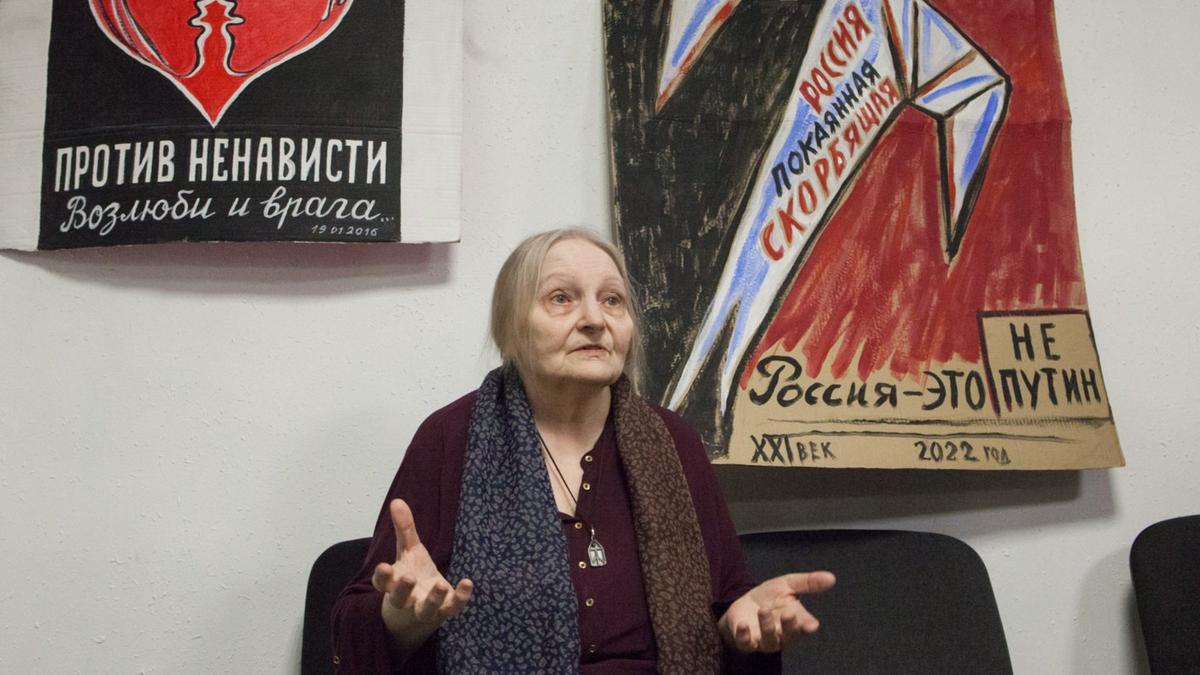St. Petersburg artist Elena Osipova, 77, was asked at the Peaceful Art Protest exhibition opening whether she is scared to display her courageous artworks in Russia now, when criminal charges are filed for any rash statement. This was her response:
“I am not scared of anything. This is my country, my Motherland. Why can’t I say or do something in my country in a peaceful manner, without weapons? I can do anything,” the tiny grey-haired woman with bright green eyes confidently said. “And the Russian Constitution, which is now obliterated, did allow this.”
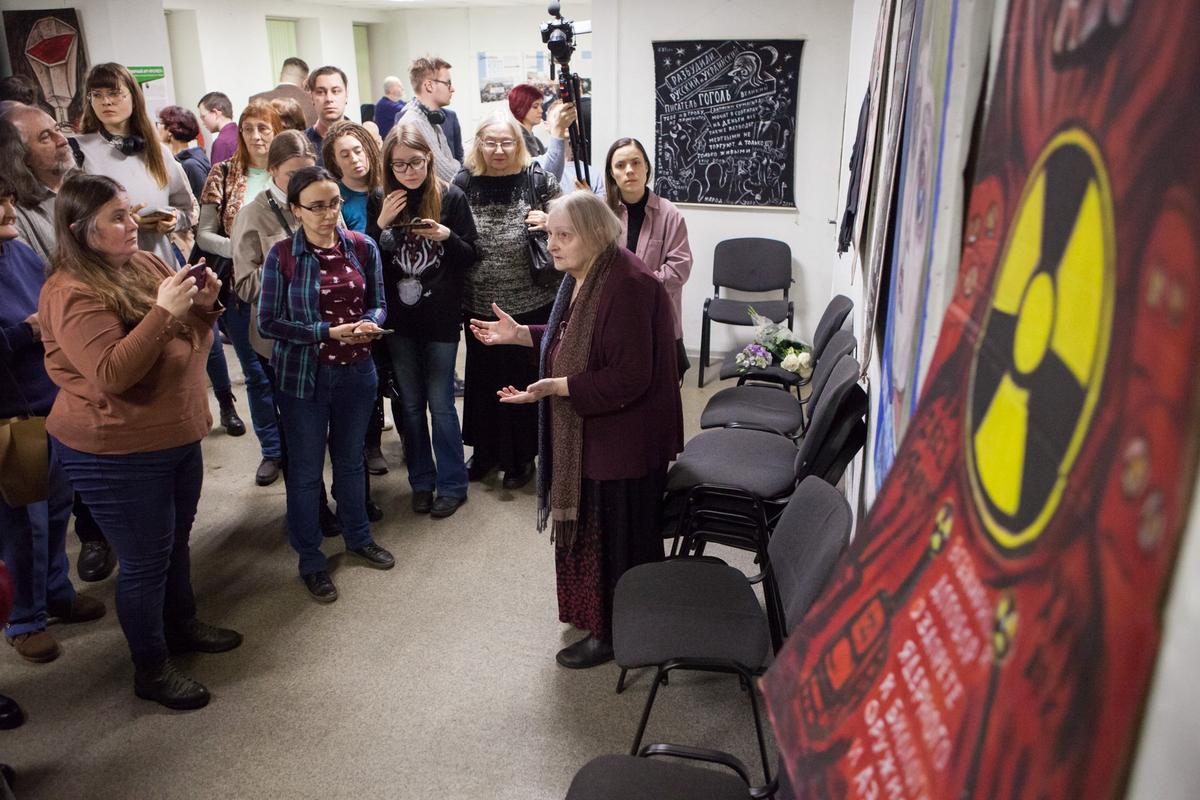
Elena Osipova at the Peaceful Art Protest exhibition. Photo: Elena Rodina for Novaya Gazeta Europe
Many of the visitors attending the exhibition opening were ready for unpleasant surprises: the police could show up at any moment. The nearest St. Petersburg police station is located in the same building as the St. Petersburg office of Yabloko, Russia’s opposition social-liberal political party, that opened its doors to Elena Osipova’s anti-war posters. The event went as planned on 31 January. It can be partially attributed to the cautiousness of the organisers:
“Unfortunately, we just could not display all the works publicly here,” chair of Yabloko’s St. Petersburg office Alexander Shishlov lamented. “The current laws are what they are, and we are forced to factor them in. We could not compromise either Elena Osipova or Yabloko. Because some artworks, striking and poignant, accurate to the highest degree in their meaning, contain words that will in the best-case scenario bring about a fine or send you to prison in the worst case.”
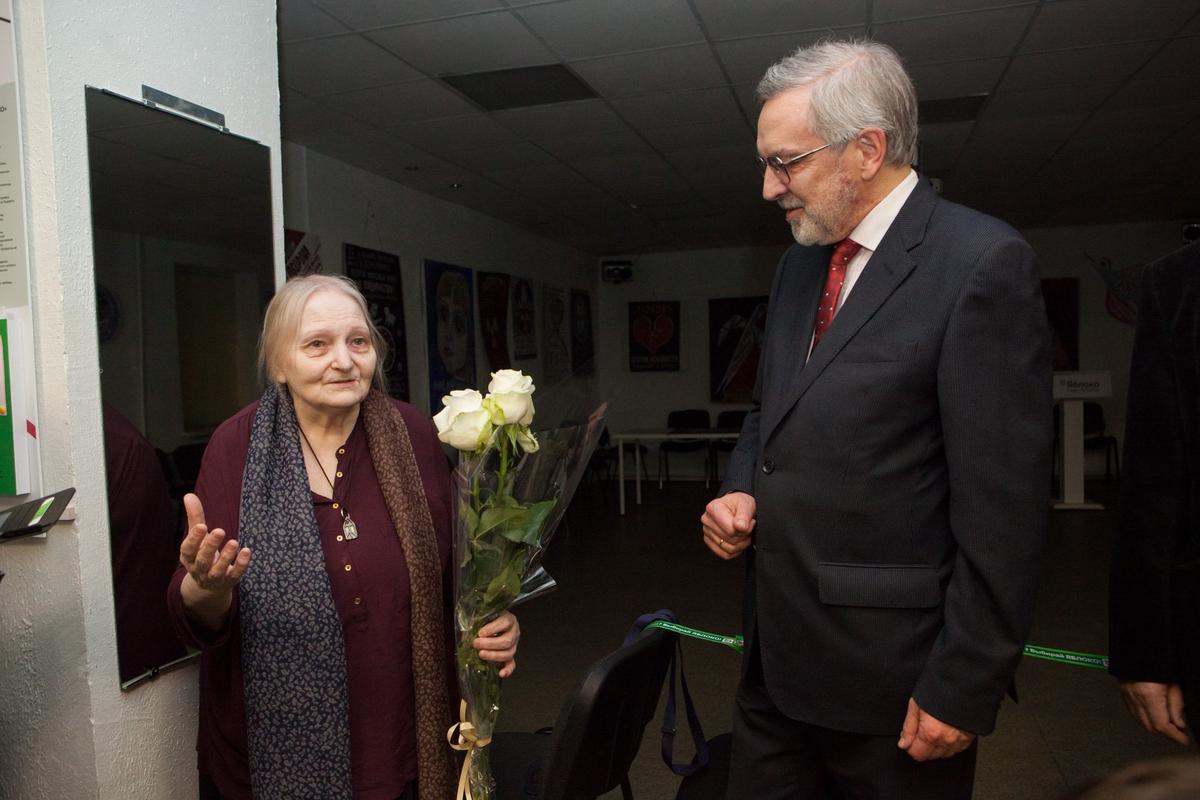
Elena Osipova and Alexander Shishlov at the Peaceful Art Protest exhibition. Photo: Elena Rodina for Novaya Gazeta Europe
Peaceful Art Protest showcases around 30 posters by Osipova created between 2014 (when the Russian-Ukrainian conflict broke out) and 2023.
“The same number is stored by the police,” the artist joked with sorrow in her voice. “When police officers detain me with posters outside, they often take them away, and I never get them back. Well, no matter,” Elena Osipova gestures away. “They might need them too.”
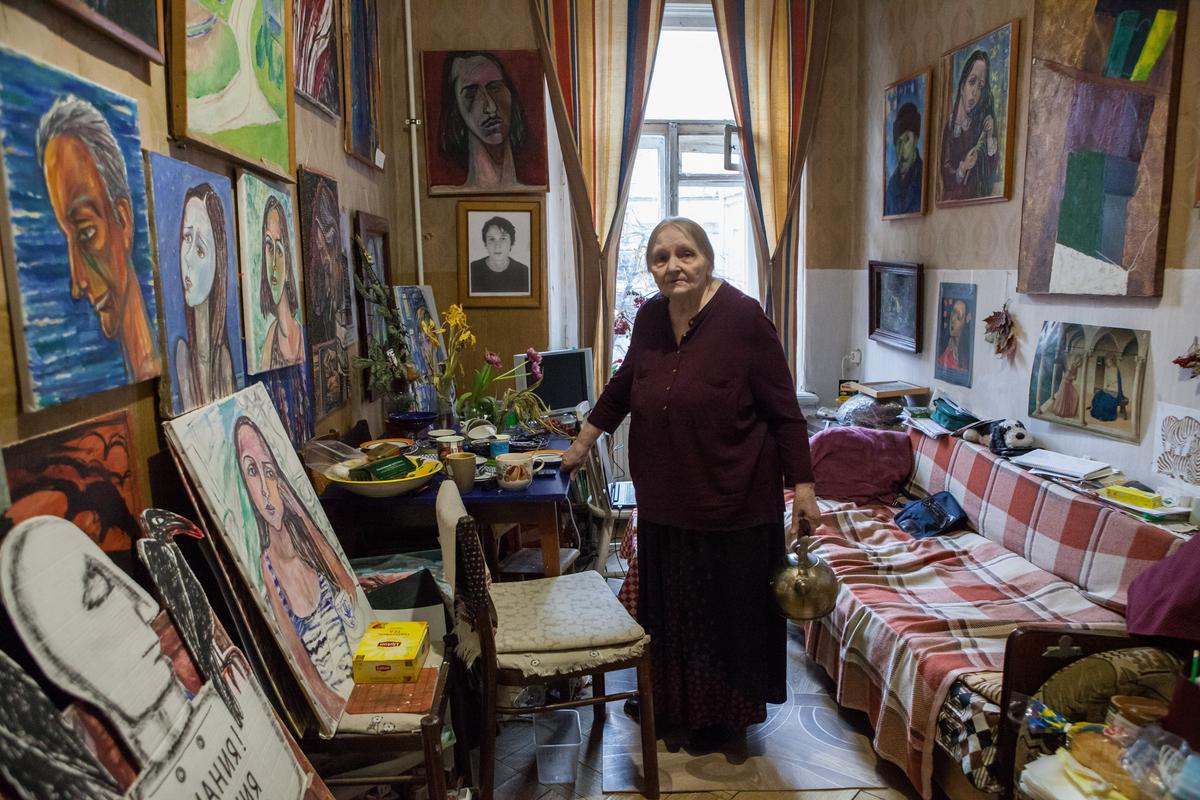
Elena Osipova. Photo: Elena Rodina for Novaya Gazeta Europe
Osipova truly has a special relationship with the police: she knows many officers personally and by name, and everyone knows her. When detained, she is taken straight home instead of a police station due to her age, health and harmless nature. This happens quite often because Elena Osipova has been relentlessly staging protests with her art posters inspired by momentous events in downtown St. Petersburg for more than 20 years.
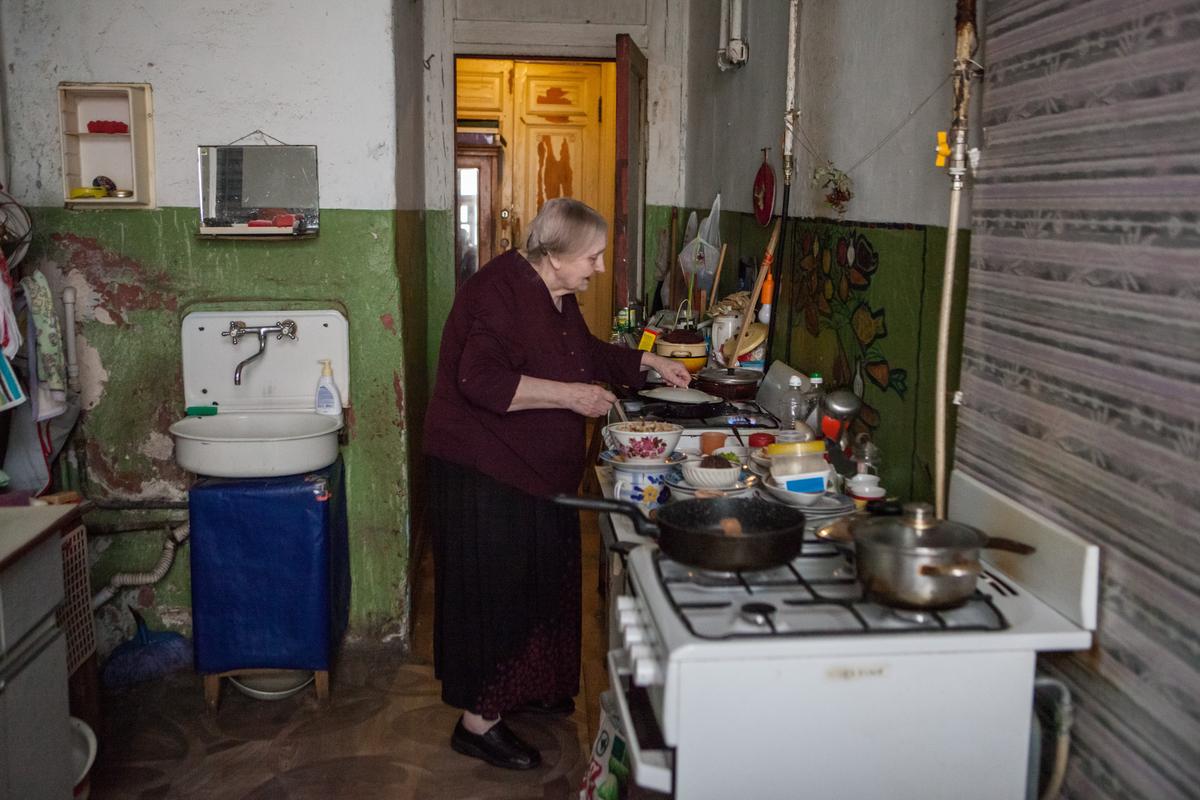
Elena Osipova. Photo: Elena Rodina for Novaya Gazeta Europe
Osipova is often mistakenly described as a Leningrad Siege survivor. “It’s not true. I am the same age as the war,” she clarified. But it would be more accurate to say that she is the same age as the victory. Elena Osipova was born in 1945, the year that brought the long-awaited peace to the world. Maybe that’s where her unyielding yearning for peace, kindness, and truth comes from. An artist by education and a teacher by trade (she taught art in schools before retirement), Osipova decided to speak to people about the most important things in a language she has mastered.
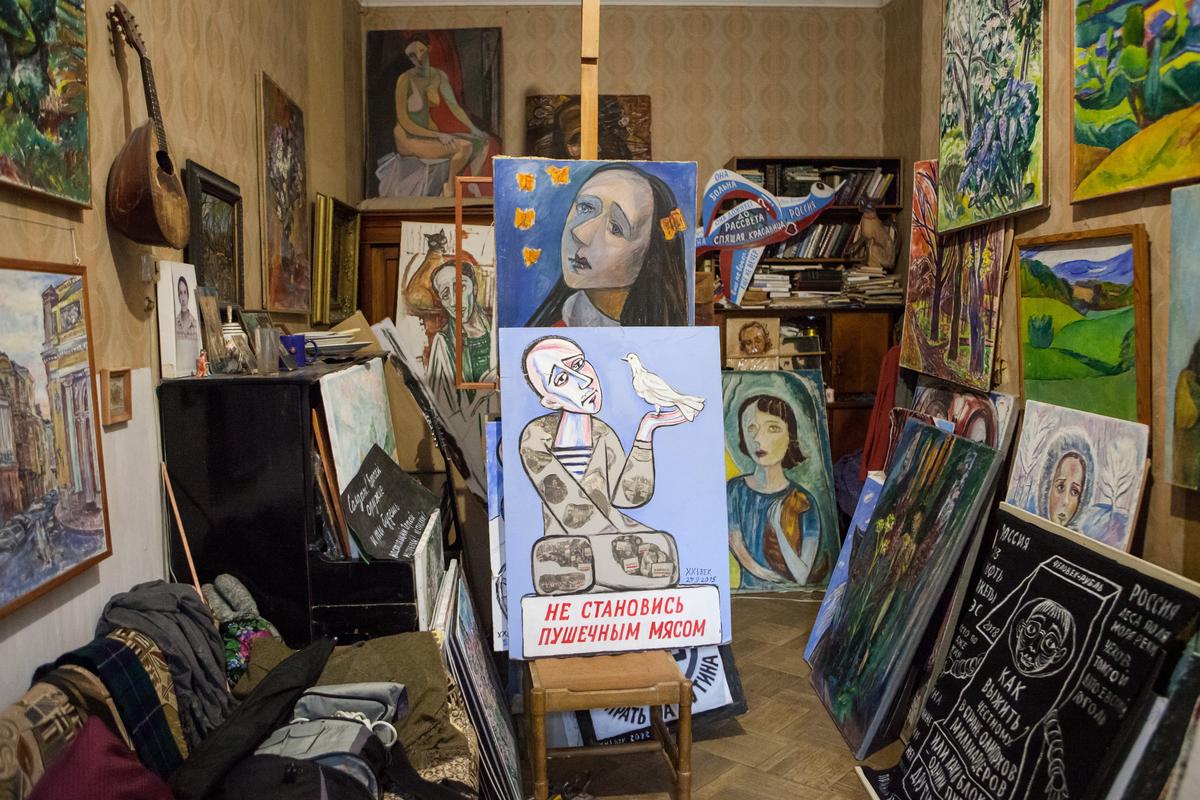
“Don’t become cannon fodder.” Elena Osipova’s works. Photo: Elena Rodina for Novaya Gazeta Europe
The exhibition in the Yabloko office displays only Osipova’s posters and not paintings (this is her first event of this kind). The artist draws a strict distinction between the notions of posters and paintings and reminds everyone about the difference. Paintings are something that she creates when her heart calls, for her soul, art, and eternity. Meanwhile, posters are topical and relevant for people to see and hear what should be known.
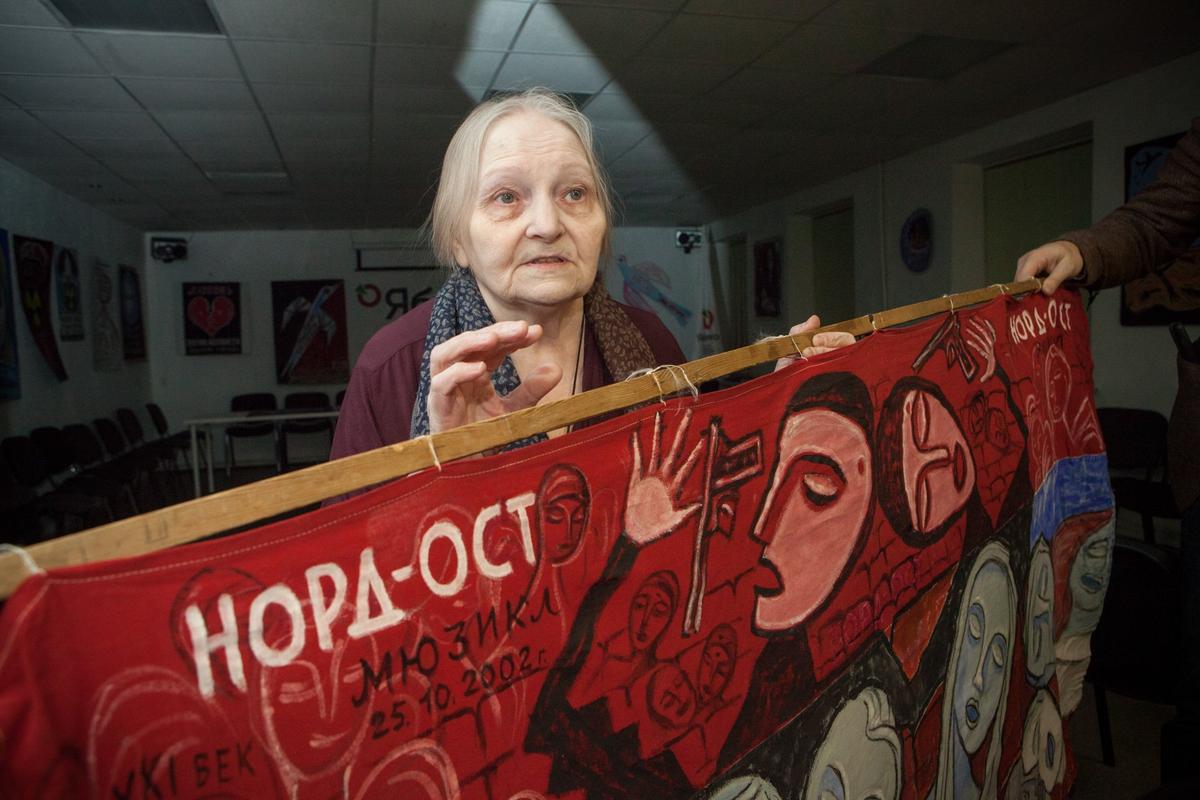
“Nord-Ost musical” (reference to the 2002 Moscow theatre hostage crisis). Elena Osipova’s first poster. Photo: Elena Rodina for Novaya Gazeta Europe
Elena Osipova painted her first poster 21 years ago, and it still feels current (this artwork was also shown at the Yabloko exhibition). It was the autumn of 2002 after Nord-Ost (Moscow theatre hostage crisis when Chechen terrorists stormed into the Dubrovka Theatre in Moscow and took the audience hostage — translator’s note). This was the first time that Osipova staged a protest in the streets.
“The night when the theatre was stormed, I was working at home, I was painting on a couch in front of the TV,” she recalls. “The Dubrovka events were broadcast live. Everyone was waiting for the endgame, and so was I, I witnessed this horror. I saw a girl with a very long braid. She was carried like a log, and the braid was dangling in the back. I saw buses filled with people with their heads thrown back… And then a few days later, the news broadcasts were showing Putin visiting hospitals, stretching his hand out, and people who were almost killed by the gas (Russian forces pumped an aerosol anaesthetic into the theatre to storm the building — translator’s note) and lost family members and friends, shake his hand.”
Support independent journalism
The artist could not tolerate it any longer, took a sheet of paper and a brush, and wrote this: “President, urgently change your course”. She brought the poster to the St. Petersburg legislative assembly. She stood on the building’s steps all alone the whole day. Nobody approached her or asked her anything. Back then, people were not detained for one-man protests, laws about “fakes” hadn’t been invented yet, foreign agents and extremists were not hunted in Russia 20 years ago.
“Nevertheless, people were just ignoring me,” Elena Osipova says. “They were passing by and were even scared to turn their heads towards me. Russians swallowed Nord-Ost. They then silently stomached Beslan (The 2004 Beslan school hostage crisis in Russia’s North Ossetia–Alania. More than 1,100 people were taken hostage by terrorists, including 777 children. 333 hostages died, approximately 783 more were injured — translator’s note). Only then were the parents of the killed children taking to the streets with small self-made posters. Meanwhile, the country was sleeping. People were enduring this the whole time. And this is what it has led us to. We are now at war with Ukraine. The whole world now has turned its back on Russia.”
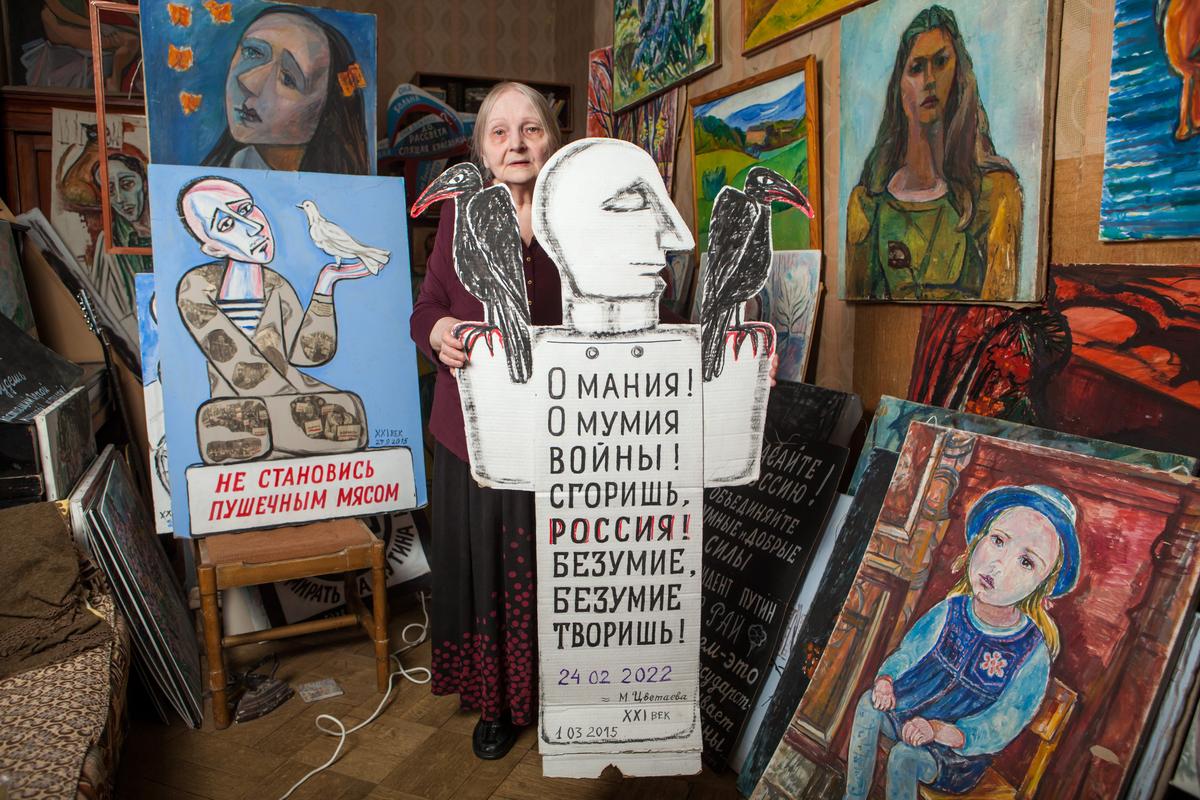
(Left to right) “Don’t become cannon fodder.” “Oh, mania! Oh, the mummy of war! Russia, you will burn! You are wreaking havoc!” Artworks by Elena Osipova. Photo: Elena Rodina for Novaya Gazeta Europe
The artist is convinced that the most horrifying events inevitably give birth to art.
“This summer, I received fresh scarlet tulips from The Netherlands. And they suddenly faded and wilted. They just fell from the table. Like young blood to the ground. I immediately had this image and started drawing. And that’s when our first soldiers who went to the special operation zone died. God knows what for. All with the letter Z on them. I wrote the words by [Russian poet] Alexander Vertinsky which I modified a little: ‘He sent them to their deaths with an unquivering hand’ (from the What I Have to Say poem — author’s note).”
This poster is not displayed at the exhibition: it was previously seized by police. Strangers stole two more posters from Osipova on 9 May, Victory Day in Russia.
“I created them specifically for Victory Day and wanted to take them to the centre of the city,” the woman recalls. “But two chaps ran up to me right in my apartment building’s yard, wrested the posters out of my hands, and fled. I first got quite down and thought I would not now go to the Victory Day parade. I really wanted to be there. I always come out in protest. I did not want to take part in this hypocrisy. What I did want to see is how many people would come out with a Z. And then I went back home, took an even more hard-hitting poster, and went to the St. Isaac’s Square where people were walking.”
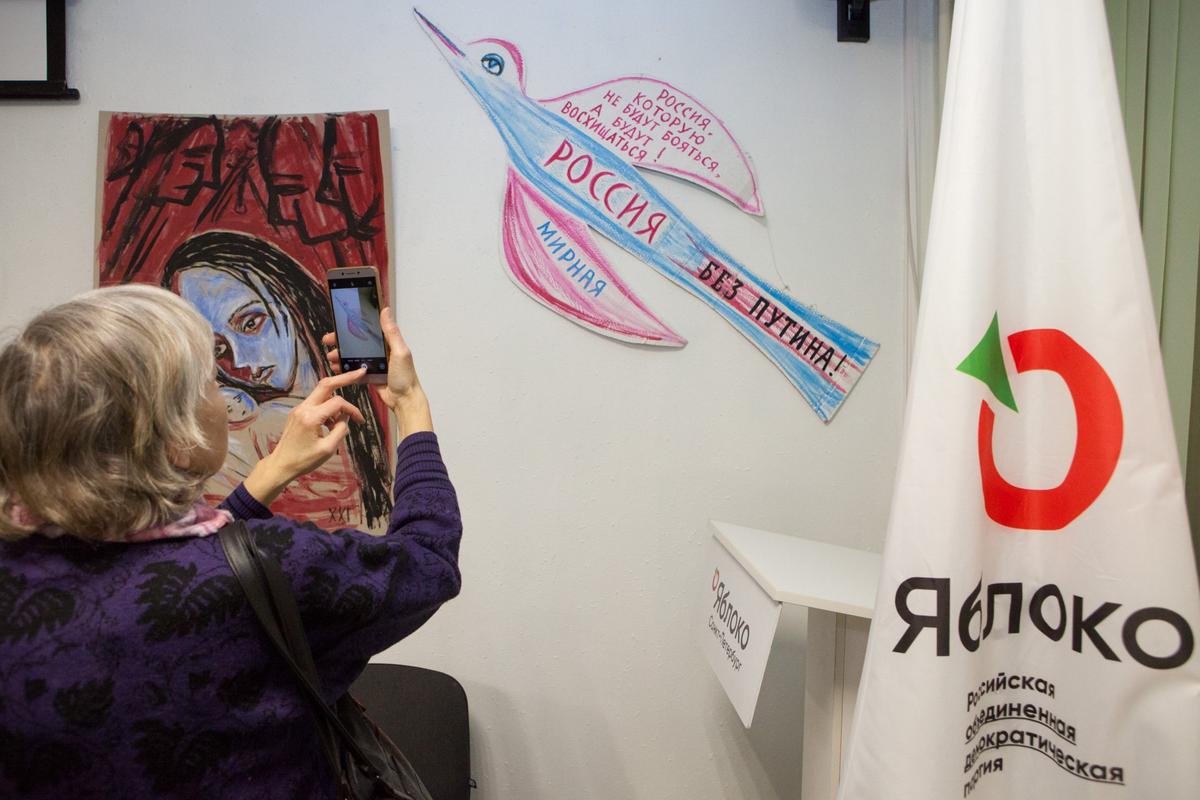
“Russia that will not be feared but admired. Russia without Putin. Peaceful.” Peaceful Art Protest exhibition. Photo: Elena Rodina for Novaya Gazeta Europe
Osipova is shocked at how many Russians support the “special military operation”.
“The war won’t end as long as so many people in Russia want to fight. Well, money also plays a big role here,” the artist notes. “Many go to war from the very rural regions and villages where they don’t even have schools. They see the war as a chance to earn at least some money. Putin is rich, he hands out money for fighting in the war. And mothers are ready to give up their sons for money. When did anything like that ever happen?”
Elena Osipova is always either outraged or surprised when people thank her for her bravery.
“What does bravery have to do with it? What bravery?” she gets confused. “When I was studying in an art school, I had a teacher, she was almost at her retirement age, who survived the Stalin era and was sent to camps. She was always telling us: ‘What are you scared of in your Fatherland?’ Some warn: ‘You risk so much!’ But what do I actually risk? It’ll be my time to die soon. The youths do risk a lot. I am sure that there are a lot of rational people who oppose the war in Russia. But they are all facing difficult conditions at work and studies, facing fines and prison sentences. Most people in Russia just cannot afford these enormous fines. The people are financially suffocated.”
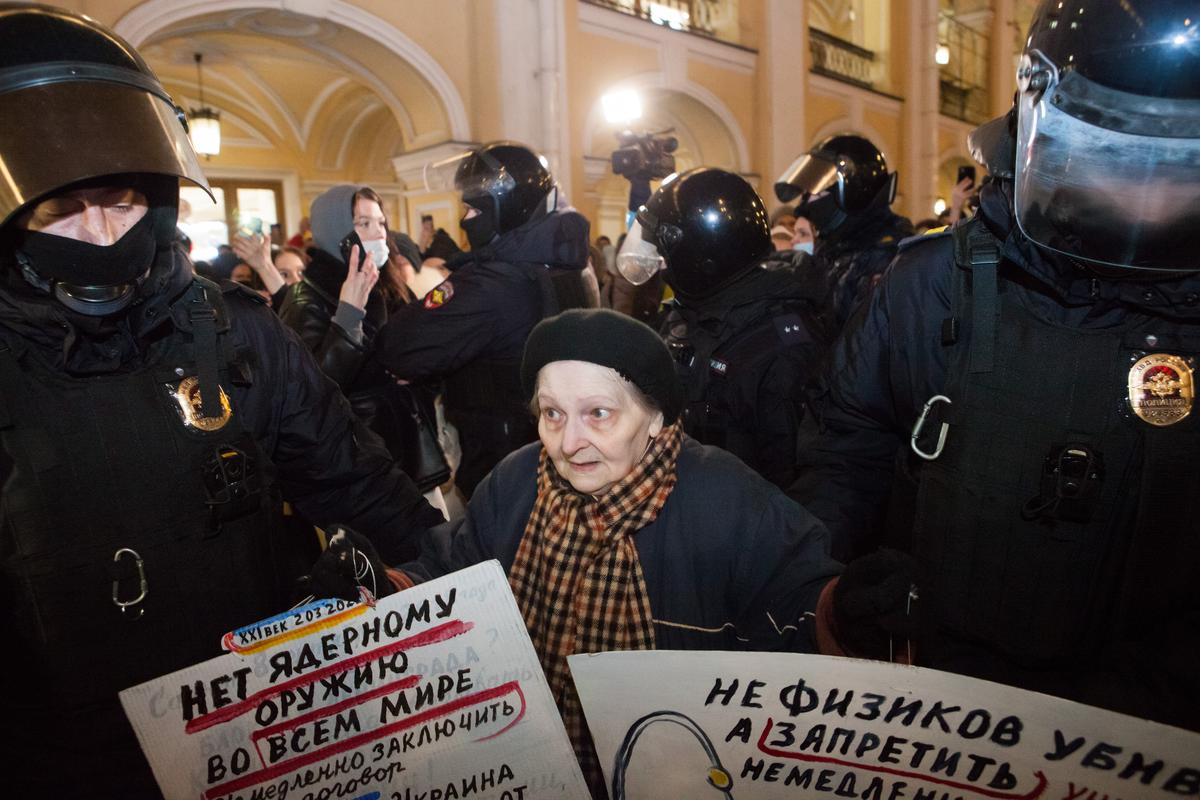
Elena Osipova’s being detained by police. Photo: Elena Rodina for Novaya Gazeta Europe
Osipova has long not been slapped with any fines after police detentions: there is simply nothing she can pay them with. Her pension is 6,000 rubles (€78), she gets an extra 1,500 rubles (€19.5) as a low-income person. However, she needs to pay 5,000 rubles (€65) in housing fees.
“Pay it, lie down, and die! Of course, I don’t pay for anything,” the woman shrugs. “I only spend money on food. My landline was long cut off for failure to pay. My friends pay for my cell phone. Hostile people in the streets sometimes reproach me: ‘You’ve been paid, you protest for money’. What money?” the artist smiles. “I haven’t sold a single poster in 20 years, I keep them all. Other people take pictures of my posters, make copies, and sell them. But I cannot be responsible for it. People in the streets sometimes try to give me money, they sincerely want to help, I can see this. But I cannot accept it. If I take a single ruble, it will cancel out everything I do. And I do it because of my beliefs and not for money. My beliefs are not for sale.”
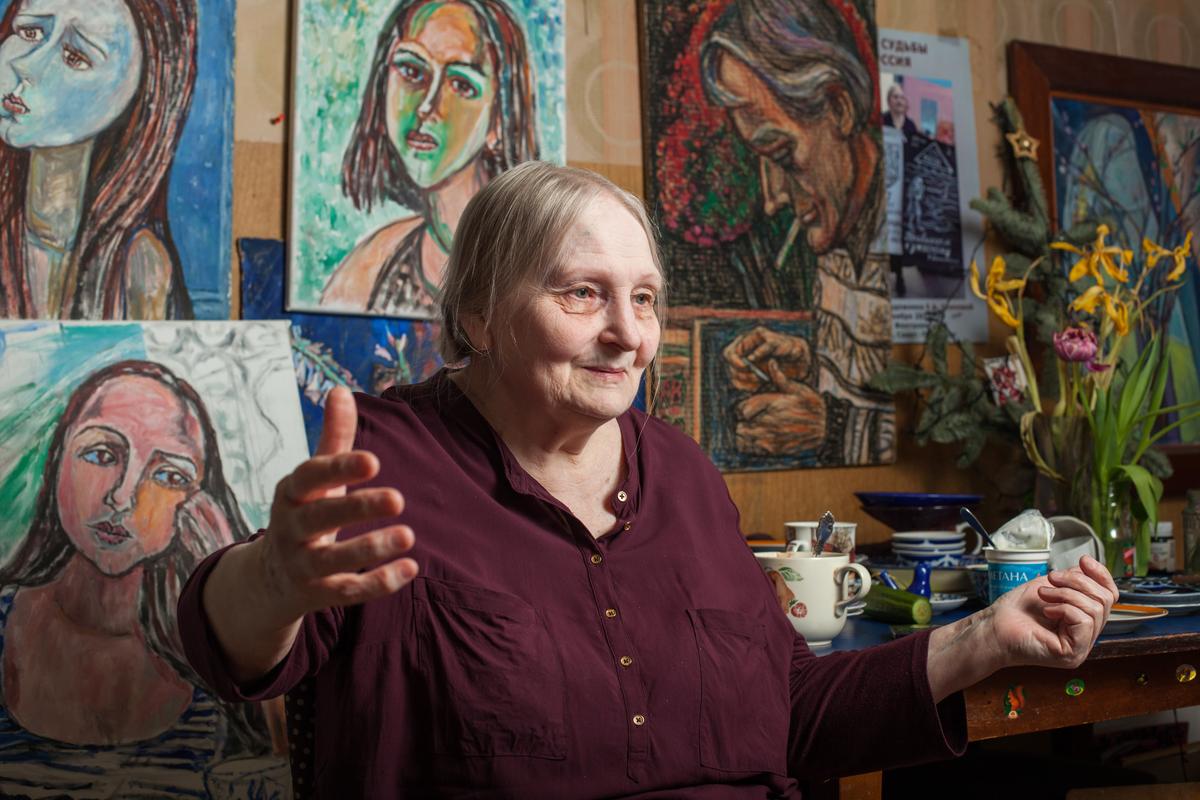
Elena Osipova. Photo: Elena Rodina for Novaya Gazeta Europe
She only sold one poster over the years. As an exception.
“An Italian man once came to visit me,” Elena Osipova says. “He spent a lot of time talking me into selling one of my artworks to him. I objected and didn’t want to sell any poster. But then we did find one of my old pieces in a few hours’ time. It depicts Hitler against a black backdrop with a hand stretched out in a Nazi salute and a crowd of people in grey opposite him who hail the Führer in return. The poster read: ‘He also had a high approval rating’. I thought about it and decided that Hitler can be sold. I believe my conscience is clear here.”
Osipova only associates Putin with the Führer. She is dreaming of seeing the day when the Russian president feels the need to repent.
“When a person reaches an age like [Russian politician Vladimir] Zhirinovsky, who passed away recently, they need to start thinking about repenting for the harm they caused to others in their lives. It is still not too late to change the course: stop the war in Ukraine and turn this situation, a terribly tragic one, to everyone’s benefit. A treaty banning the use of nuclear weapons all over the world should be immediately adopted so that those who died on both sides didn’t do so in vain. We are now living on a gunpowder keg — a nuclear war can start at any moment.
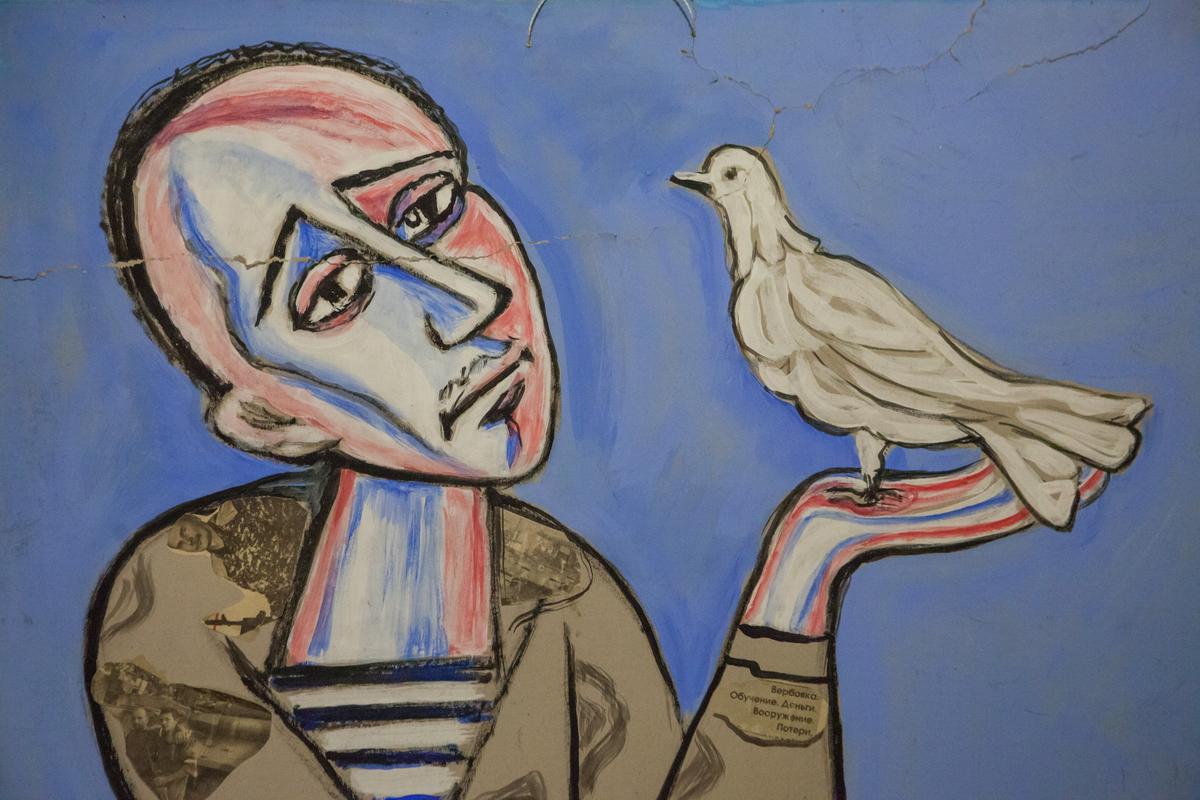
Photo: Elena Rodina for Novaya Gazeta Europe
Elena Osipova admits that it’s getting harder and harder for her to protest in the streets with each passing year. It’s hard to stand outside if there’s nothing to lean on: her back and legs get sore. The elderly woman cannot hold posters in her hands for a long time. She needs to be carried inside police vans because she cannot raise herself up anymore.
“However, when something terrible happens in Russia that you cannot stay silent about, I find strength, I don’t know where it comes from,” the artist says. “Physically speaking, I feel awful. I understand that I can die any moment, I only keep going thanks to medicine. But the feeling of importance of events gets me up, I go to people to tell them what they need to hear in time.”
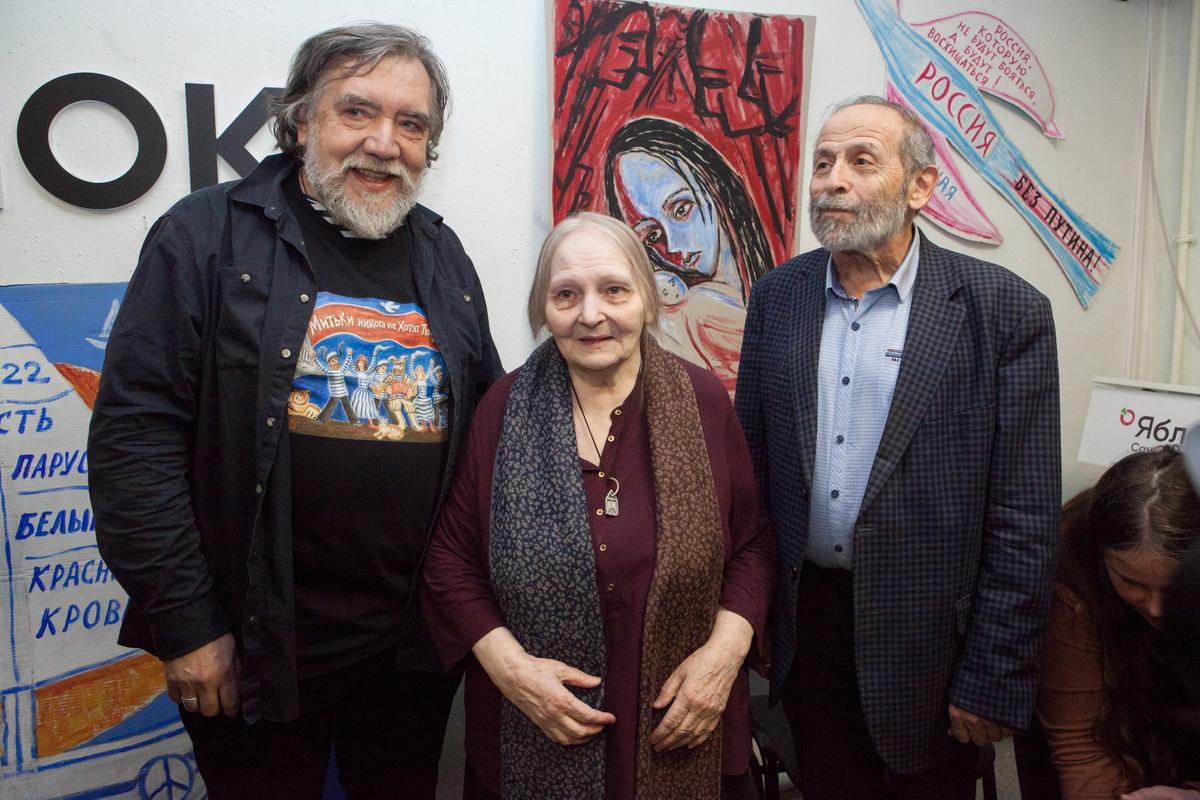
Dmitry Shagin, Elena Osipova, and Boris Vishnevsky. Photo: Elena Rodina for Novaya Gazeta Europe
“Elena Osipova is very correctly and accurately called ‘St. Petersburg’s conscience’,” deputy head of Yabloko’s St. Petersburg office Boris Vishnevsky said at the exhibition opening. “She joins every protest in St. Petersburg, any time of the day, no matter the weather, with her artworks that call on our conscience, feelings of justice and responsibility. If our city had a legislative assembly as it is supposed to be, Elena Osipova would long be recognised as an honorary citizen of St. Petersburg.
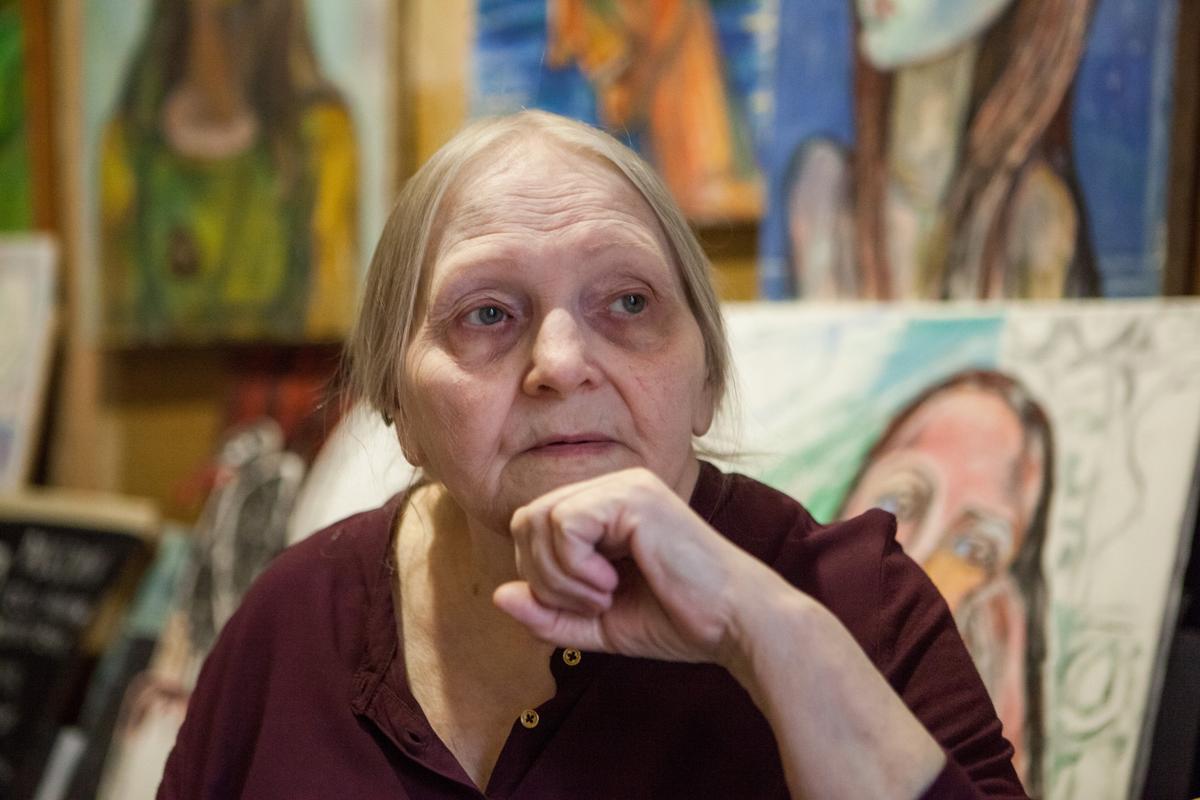
Elena Osipova. Photo: Elena Rodina for Novaya Gazeta Europe
The 77-year-old artist has so far been only named an honorary citizen of Italy’s Milan. The city council on 7 April awarded her the title of a “woman-symbol against war” for her public opposition to the Ukraine conflict. Osipova has become the third person from Russia to be lauded as Milan’s honorary citizen after academician Dmitry Likhachev and composer Mstislav Rostropovich.
P.S.
Elena Osipova’s exhibition was meant to stay open until 24 February. However, the police shut it down already at 2 PM on 1 February, the next day after the opening. Yabloko members were told that a bomb threat call had been registered, claiming that an explosive device was planted in the building. All employees were removed from the office under this pretext, the building itself was cordoned off. Bomb experts and dog handlers were working at the site. No explosives were discovered. Nevertheless, an investigation team arrived there around 4 PM and started seizing art posters by Elena Osipova.
“We were told this as an explanation behind the seizure of posters: when inspecting the building for bombs, police officers accidentally noticed Elena Osipova’s artworks which they believe can warrant an administrative offence charge,” Vishnevsky told Novaya-Europe.
The investigation team is currently deciding whether to open an administrative offence case. The posters will be sent for an expert analysis.
Join us in rebuilding Novaya Gazeta Europe
The Russian government has banned independent media. We were forced to leave our country in order to keep doing our job, telling our readers about what is going on Russia, Ukraine and Europe.
We will continue fighting against warfare and dictatorship. We believe that freedom of speech is the most efficient antidote against tyranny. Support us financially to help us fight for peace and freedom.
By clicking the Support button, you agree to the processing of your personal data.
To cancel a regular donation, please write to [email protected]
